
The Internet's Premier Classical Music Source
Related Links
- Latest Reviews
- More Reviews
-
By Composer
-
Collections
DVD & Blu-ray
Books
Concert Reviews
Articles/Interviews
Software
Audio
Search Amazon
Recommended Links
Site News
 CD Review
CD Review
Sony Masterworks Heritage Reissues
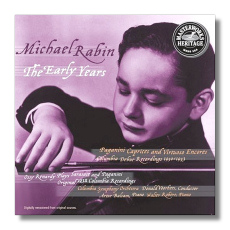
Michael Rabin - The Early Years
- Antonín Dvořák: Slavonic Dance, Op. 46 #2 1,2
- Carl Engel: Sea-Shell 1,2
- Fritz Kreisler: La chasse in the style of Cartier 1,2
- Henri Wieniawski: Etudes-Caprice, Op. 18 #4 1,2
- Niccolò Paganini:
- 11 Caprices for Violin Solo, Op. 1 #1, 5, 9, 11, 13, 14, 16-18, 21 & 24 1
- Moto perpetuo, Op. 11 1,3
- Sonata in E minor, Op. 3 #6 4
- Ottokar Novácek: Caprice "Perpetuum mobile", Op. 5 #2 1,3
- Pablo de Sarasate:
- Adiós montañas mias, Op. 37 4
- Zigeunerweisen, Op. 20 1,3
- Carmen Fantasy, Op. 25 Finale 1,2
- Spanish Dance, Op. 23 #2 "Zapateado' 4
- Spanish Dances, Op. 22 4
- William Kroll: Banjo and Fiddle 1,2
1 Michael Rabin, violin
2 Arthur Balsam, piano
3 Columbia Symphony Orchestra/Donald Voorhees
4 Ossy Renardy, violin
4 Walter Robert, piano
Sony Masterworks Heritage MHK60894 ADD, monaural 78:41

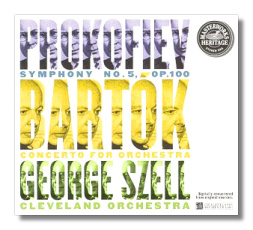
- Serge Prokofieff: Symphony #5
- Béla Bartók: Concerto for Orchestra
Cleveland Orchestra/George Szell
Sony Masterworks Heritage MHK63124 ADD 73:37

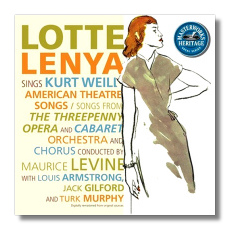
Lotte Lenya Sings Kurt Weill - The American Theatre Songs
- Kurt Weill:
- Knickerbocker Holiday: September Song & It never was you
- Lady in the Dark: Saga of Jenny
- One touch of Venus: Foolish heart & Speak Low
- Firebrand of Florence: Sing me not a ballad
- Street Scene: Lonely house & A boy like you
- Love life: Green-up time
- Lost in the Stars: Trouble man, Stay well & Lost in the stars
- The Eternal Road: Song of Ruth
- Die Dreigroschenoper (Three-Penny Opera): Salomon Song & Die Moritat von Mackie Messer "Mack the knife"
- Paul Dessau: Mutter Courage und ihre Kinder: Lied der Mutter Courage
- Hanns Eisler: Lied einer deutschen Mutter
- John Kander: Cabaret: It Couldn't Please Me More, Married, So What? & What Would You Do?
Lotte Lenya & Jack Gilford, vocals
Turk Murphy, trombone
Louis Armstrong & His All-Stars
Orchestra & Chorus conducted by Maurice Levine
Sony Masterworks Heritage MHK60647 ADD 78:39

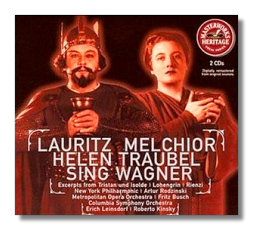
Melchior And Traubel Sing Wagner
- Richard Wagner:
- Extended excerpts from Lohengrin
- Excerpts from Tristan und Isolde
- Rienzi: Rienzi's Prayer
Helen Traubel & Astrid Varnay, sopranos
Lauritz Melchior, Torsten Ralf & Kurt Baum, tenors
New York Philharmonic Orchestra/Artur Rodzinski
Metropolitan Opera Orchestra/Fritz Busch
Columbia Symphony Orchestra/Erich Leinsdorf
Orchestra of Teatro Colón, Buenos Aires/Roberto Kinsky
Sony Masterworks Heritage MH2K60896 ADD mono 2CDs 61:01, 73:40

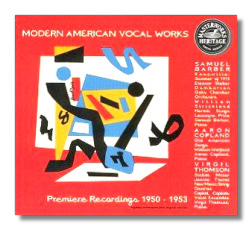
Modern American Vocal Works
- Samuel Barber:
- Knoxville: Summer of 1915
- Hermit Songs
- Aaron Copland: Old American Songs, Sets 1 and 2
- Virgil Thomson:
- Stabat Mater
- Capital, Capitals
Eleanor Steber, Leontyne Price, sopranos
William Warfield, baritone
Jennie Tourel, mezzo-soprano
Samuel Barber, Aaron Copland, Virgil Thomson, pianos
Male Vocal Quartet
New Music String Quartet
Dumbarton Oaks Chamber Orchestra/William Strickland
Sony Masterworks Heritage MHK60899 ADD mono 79:31
Make way for the teenage violinists! I am not exaggerating when I tell you that the Rabin and Renardy CD contains some of the most superb violin-playing ever committed to disc. Rabin recorded extensively for Capitol/EMI in the late 1950s and early 1960s. These Columbia recordings, however, come from 1950-1953; Rabin was just 14 at the earliest sessions. It was at that same age that he made his first appearances on the "Bell Telephone Hour" and at Carnegie Hall, and an American star was born. Unfortunately, that star would be extinguished as the 1960s went on, and Rabin died in 1972 at the age of 35. Alcohol and drug abuse are suspected to have contributed to his decline and ultimate fall.
Rabin made three records for Columbia, and their complete contents are gathered here. A selection of eleven Paganini Caprices gives the lie to the attitude that this music is more interesting to the performer than to the listeners. Rabin makes light of the music's technical challenges, and he makes these works into engaging encores. Sarasate's Concert fantasies on "Carmen" and Zigeunerweisen give Rabin more opportunities for jaw-dropping virtuosity; his tone never thins out, no matter how high and fast he plays. That he was a great legato player too is demonstrated by Carl Engel's Sea Shell, which Rabin plays with sentiment but not sentimentality.
Ossy Renardy was born in 1920. He died at an even younger age – just 33 – as a result of a car accident. The recordings preserved here come from 1938 and 1939. Four Spanish Dances by Sarasate show off his fiery temperament, and a Paganini sonata seems uncommonly substantial under his bow. Renardy, like Rabin, pours out characterful tone with a generosity that is more or less unheard of today. These recordings belong in every fiddle-fancier's collection. The transfers (from 78-rpm discs in Renardy's case) are first-class.
George Szell has not been forgotten by the Masterworks Heritage series, and the latest release contains much that is provocative. Szell's Prokofieff Fifth, recorded in 1959 and originally released on the Epic label, is steely; the conductor's view of this score is not at all elegiac. I think that this is one of the Fifth Symphony's best recordings. Szell seems to want to link the work back to Prokofieff's earlier and more motoric scores, and the concept works well, although it will not appeal to those who want a more upholstered version à la Karajan, for example. The Bartók comes from 1965. It lacks nothing in excitement, and Szell doesn't fool around; this is a purposeful reading. It's so purposeful, in fact, that Szell cuts 129 bars from the last movement. Whether he was right to do this or not is up to you – it tightens up the Finale to exciting effect, but the lost music is among the composer's more atmospheric and mysterious moments. The cut will knock this recording out of the running for many. I think, however, that it would be wrong not to give Szell's biting, detailed, and even occasionally droll Bartók a chance. The conductor's reputation as a perfectionist is supported by what is found here, and you will hear few performances of either work that are as intentionally shaped and balanced as these.
The Lenya disc is certainly a mixed bag. The first 13 tracks are taken directly from an LP (KL 5229) originally titled September Song and Other American Theatre Songs of Kurt Weill. This LP (with its very self-explanatory title!) was recorded in mono and stereo in August 1957. For some reason, this is the first time that it has been made available in stereo; even the last CD incarnation was monaural. The thirteenth track, "Song of Ruth" from The Eternal Road, has not been released until now. It could have fit on the LP, but perhaps it didn't really belong, since the music, strictly speaking, is a product of Weill's European years. It's a nice find. Some people say Weill's Broadway work was a big come-down after Threepenny Opera and Mahagonny. I disagree. It is not valid to compare two bodies of work that are so different. Lenya's singing is sui generis, and don't try it at home. Her voice, "one octave below laryngitis," as the expression goes, is something one must learn to accept; only then can one love it. She never stops being Lenya in any of these songs, even when the effect is gently comical. She was a smart woman, though; how clever of her to sing "Speak Low" from One Touch of Venus so intimately, instead of belting it the way some other singers do. It's a perfect decision, given her limited vocal resources. The four songs from Cabaret come straight from the Original Cast recording, which was reissued more than a year ago. (It's a must-have.) Songs from Paul Dessau's Mother Courage and Hans Eisler's Song of a German Mother come from yet another LP, Brecht on Brecht, and it would have been nice to hear more than Lenya's contributions. Two jazz versions of Mack the Knife, one in German with trombonist Turk Murphy, and one in English with Louis Armstrong, are fun but not invaluable. The CD closes with more than eight minutes of session takes from the last of these selections. In these "behind the scenes" takes, Armstrong coaches Lenya, who has a difficult time with some rather simple syncopation. If nothing else, it shows us how frustrating recording sessions can be!
The Melchior/Traubel discs are a Wagnerian's dream, and they also will be very appealing to anyone who wants to remember (or learn about) the glories of the Metropolitan Opera House in the 1940s. By this time, Melchior's voice was no longer as secure as it had been earlier in his career, but his stature as a singing actor had grown, and the last-act agony of Tristan arguably fit the "experienced" tenor like a sword in a scabbard at that time. Traubel was one of the greatest Wagnerian sopranos – certainly on a par with Flagstad and Nilsson – but she is largely forgotten, so this collection meets a definite need. You might think that they sing together in this collection, perhaps in the "Liebesnacht" from Tristan or the "Bridal Chamber Scene" from Lohengrin. Not so. In the first, Traubel's partner is Kurt Baum, and in the second, her partner is Torsten Ralf. (Both are excellent, particularly Ralf.) Melchior's partners are the solid Astrid Varnay (in Lohengrin) and baritone Herbert Janssen (in the last act of Tristan). All of these recordings, originally issued on 78-rpm discs, are redolent of stage magic, and could go a long way, even today, to prove to skeptics that Wagner is not all about long, static stretches of music in which very little happens. The transfers have been handled well, and it should noted that 1945 Traubel's recording of "Euch Lüften" from Lohengrin is seeing its first release here. One serious drawback to this issue is that there are no texts, and that surely will disappoint buyers who still are feeling their way around in this repertoire.
There are no texts with the last disc, either. However, because (almost) everything is sung in English with excellent diction by all of the singers, this is not a problem. The Barber pieces last came out on a Sony Masterworks Portrait CD in 1991, and their reissue here confirms, if confirmation were needed, their classic status. Steber's achingly beautiful Knoxville: Summer of 1915 never has been surpassed, and Price's Hermit Songs, which feature the composer at the piano, are similarly durable. These recordings were made in 1950 and 1954, respectively; Price sounds impossibly young, and is thoroughly involved. (There is an even older RCA Victor recording of the Hermit Songs with Price and Barber derived from the work's 1953 première in Washington, D.C.) Warfield's friendly personality and lack of artifice make his early 1950s versions of Old American Songs a memorable experience, and here he also is joined by the composer. (The second set is seeing its first release with this CD.) Thomson's brief (5:31, to be exact) Stabat Mater is a laconic treat, and it is very chic, despite the serious subject. Tourel is a singer in need of some assistance in the CD era, and perhaps Sony will take a hint and release some more of her recordings in the next batch of the Masterworks Heritage series. Capital, Capitals uses a text by Gertrude Stein. (Thomson and Stein collaborated on two full-length operas, The Mother of Us All, and Four Saints in Three Acts.) I find it unbearably "clever," and five minutes into the work, I am checking my watch. Unfortunately, it goes on for 17 minutes! Thomson presides at the piano through this business, which was recorded in 1951. He is at least more distinguished than the singers!
Copyright © 1999, Raymond Tuttle




















